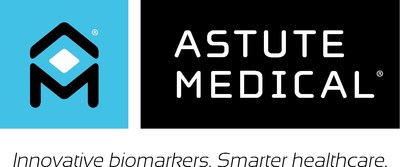Astute Medical Relelase: In New Cardiac Surgery Study NephroCheck Kidney Biomarkers Rise To The Occasion
SAN DIEGO, May 29, 2015 /PRNewswire/ -- An intervention known as remote ischemic preconditioning (RIPC) significantly reduced the occurrence of acute kidney injury (AKI) in cardiac surgery patients and confirmed that post-operative elevations of two kidney biomarkers act as an alarm for risk of AKI, according to a study published online today in the Journal of the American Medical Association.

Investigators in the study used Astute Medical, Inc.'s NephroCheck® Test to obtain measurements of the two biomarkers, tissue inhibitor of metalloproteinase 2 (TIMP-2) and insulin-like growth factor binding protein 7 (IGFBP-7). In addition to confirming that post-operative elevations of the biomarkers indicate risk for AKI, results of the study suggest that such testing could someday play a role in the optimization of preventative therapies for AKI.
AKI is one of the top ten hospital in-patient complications most likely to affect mortality, length of stay and cost.[1] Because no therapy exists for AKI, clinicians must focus on prevention and early risk assessment.[2]
"Suddenly, we have opened several new doors in the field of AKI, which has not previously seen a breakthrough of this caliber," said Dr. John Kellum of the University of Pittsburgh, who co-authored the publication. "To validate a new treatment is exciting enough, but equally intriguing is the performance of two biomarkers, which may be useful in gauging the efficacy of treatment."
The 240-patient multicenter randomized double-blind clinical trial, conducted in Germany, was performed on high-risk patients[3] undergoing cardiopulmonary bypass, an exposure linked to risk of developing AKI.2 By temporarily stopping blood flow into the arm, RIPC triggered a biomarker-based alarm mechanism sending the kidney into a defensive mode.
Investigators found that in patients receiving RIPC the occurrence of AKI decreased (from 52.5 percent to 37.5 percent; p = 0.02), as did the use of renal replacement therapy (from 15.8 percent to 5.8 percent; p = 0.01) and the duration of intensive care stay (from 4 to 3 days; p = 0.04). Furthermore, the incidence of moderate to severe AKI fell by 50 percent compared to the control group (from 25.8 percent to 12.5 percent; p = 0.02).
Investigators reported that patients with elevated post-surgical cell cycle arrest biomarker levels, as measured by the NephroCheck® Test, had a significantly increased rate of AKI compared to patients with lower biomarker levels.
"Lack of a clearly defined mechanism for AKI and the inability to deliver therapy in an effective manner to the right patients have hindered many previous attempts to prevent AKI," said Kellum. "Based on what we've learned so far, TIMP-2 and IGFBP-7 could prove useful in future studies evaluating RIPC and other potential therapies."
"These results show once again in a multicenter trial that elevations of the NephroCheck® Test cell cycle arrest biomarkers, TIMP-2 and IGFBP-7, herald high risk of an imminent AKI when measured in settings where the kidney might be stressed from exposure to significant hazards that can cause AKI, such as after cardiac surgery," said Paul McPherson, Astute Medical chief scientific officer.
Dr. Kellum is an inventor of the biomarker technology that is covered under a patent application filed by the University of Pittsburgh, WESTFALISCHE WILHELMS-UNIVERSITAT MUNSTER, and Astute Medical. He has received grant support and consulting fees from Astute Medical, Inc.
About Astute Medical, Inc.
Selected to the 2014 Fierce 15 by Fierce Medical Devices, Astute Medical is dedicated to improving the diagnosis of high-risk medical conditions and diseases through the identification and validation of protein biomarkers that can serve as the basis for novel diagnostic tests.
The Company's focus is community- and hospital-acquired acute conditions that require rapid diagnosis and risk assessment. Astute Medical's current areas of interest include abdominal pain, acute coronary syndromes, cerebrovascular injury, kidney injury and sepsis.
Astute Medical is a founding partner of 0by25, a human rights initiative aimed at eliminating preventable and treatable deaths from AKI worldwide by 2025.
Astute Medical's NephroCheck® Test is currently available in the United States and Europe. The test received 510(k)-clearance through the FDA's de novo classification process in September of 2014. In the United States the NephroCheck® Test is the only test that has received regulatory clearance as an aid in the assessment of risk for moderate or severe AKI. The test was CE-marked in 2012. For information regarding trademarks and other intellectual property applicable to this product, including international trademarks, please see astutemedical.com/about/intellectual-property. PN0465 Rev A 2015/05/28
For additional information, please visit AstuteMedical.com.
[1] Premier, Inc. Complications Research: Identifying hospital-wide harm associated with increased cost, length of stay and mortality in U.S. hospitals. June 2014.
[2] Kidney Disease: Improving Global Outcomes (KDIGO) Acute Kidney Injury Work Group. KDIGO Clinical Practice Guideline for Acute Kidney Injury. Kidney inter., Suppl. 2012; 2: 1-138.
[3] Patients were defined as "high risk" by a Cleveland Clinic Foundation score greater than or equal to 6.
Logo - http://photos.prnewswire.com/prnh/20150317/182230LOGO
To view the original version on PR Newswire, visit:http://www.prnewswire.com/news-releases/in-new-cardiac-surgery-study-nephrocheck-kidney-biomarkers-rise-to-the-occasion-300090643.html
SOURCE Astute Medical, Inc.
 Help employers find you! Check out all the jobs and post your resume.
Help employers find you! Check out all the jobs and post your resume.
